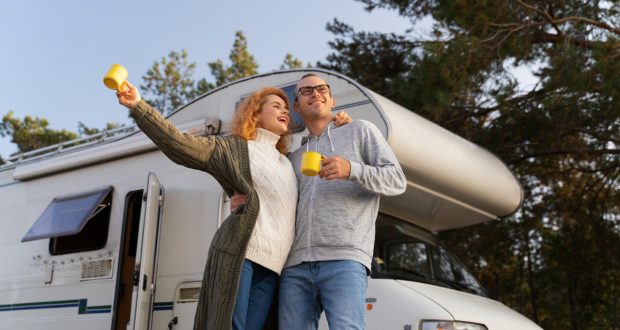Planning an RV holiday is an exciting adventure. Travelling in an RV offers a distinctive and flexible way to see the great outdoors, whether you’re going to a remote campground in the mountains or exploring the stunning coastline. However, one aspect of RV travel that can sometimes put a dent in your budget is electricity costs. From powering appliances to running air conditioning, electricity consumption can add up quickly. In this article, we’ll share some valuable tips on how to lower your electricity costs and save money during your RV holiday.
One effective way to reduce your electricity costs while enjoying the comfort of your RV is by utilizing solar power. You can become more independent and less reliant on conventional electricity sources by using solar energy, which is a clean, sustainable energy source. Many RV owners are now equipping their vehicles with solar panels to harness the power of the sun and generate electricity for their solar powered caravan A/C. You may reduce your electricity expenditures and help create a more environmentally friendly and sustainable travel experience by using solar power.
One significant advantage of using solar power in your RV is the ability to run appliances and devices without draining your battery or relying on external power sources. For instance, if you’re concerned about keeping your caravan’s air conditioning system running while parked in a remote location, you can consider installing a solar-powered caravan A/C unit. These innovative systems utilize solar panels to generate electricity, allowing you to keep your RV cool and comfortable without the need for external power connections.
Apart from utilizing solar power, there are several other practical tips you can implement to reduce your RV’s electricity consumption and lower your costs. Let’s explore them further:
1. Optimize Your Lighting
Replace traditional incandescent bulbs with energy-efficient LED lights. LED lights consume significantly less energy and have a longer lifespan, making them an excellent choice for RV lighting.
2. Monitor and Manage Your Power Usage
Keep track of your power usage by using a monitor or energy management system. This will allow you to identify power-hungry appliances and make adjustments accordingly. By being mindful of your electricity consumption, you can avoid unnecessary energy waste.
3. Use Energy-Saving Appliances
When choosing appliances for your RV, opt for energy-efficient models. Look for appliances with high Energy Star ratings, as they are designed to minimize electricity usage without sacrificing performance.
4. Insulate and Ventilate Your RV
Proper insulation helps maintain a comfortable temperature inside your RV without relying heavily on air conditioning or heating systems. Similarly, good ventilation allows for natural airflow, reducing the need for fans or air conditioning.
5. Take Advantage of Natural Light
Utilize as much natural light as possible by opening your curtains and shutters during the day. This will reduce the need for artificial lighting, saving both electricity and money.
6. Practice Efficient Cooking
Cooking can be a significant source of electricity usage in an RV. Opt for one-pot meals, use a pressure cooker, or consider grilling outdoors to minimize the use of electric appliances such as ovens and stoves.
7. Embrace Natural Cooling Methods
Instead of relying solely on air conditioning, explore natural cooling methods. Park your RV strategically to take advantage of shade or breeze. Use window coverings or reflective materials to minimize heat absorption from the sun. Utilize fans or create cross-ventilation to circulate air inside the RV.
8. Utilize Campground Amenities
When staying at campgrounds, take advantage of their amenities such as showers, laundry facilities, and communal kitchens. By utilizing the amenities provided by campgrounds, you can reduce the need to use your RV’s electricity for activities like showering or doing laundry. This not only saves on electricity costs but also conserves water, another valuable resource.
9. Maximize Battery Efficiency
Properly maintaining and optimizing your RV’s battery can significantly impact your electricity costs. Ensure that your battery is in good condition and fully charged before your trip. Avoid overcharging or discharging your battery excessively, as it can shorten its lifespan and reduce efficiency.
10. Unplug When Not in Use
Even when not in use, appliances and devices continue to draw power if they’re plugged in. Unplug electronics, chargers, and other devices when they’re not actively being used to avoid unnecessary electricity consumption.
11. Be Mindful of Entertainment Devices
TVs, gaming consoles, and other entertainment devices can consume a considerable amount of electricity. Limit their usage or opt for low-power alternatives like portable DVD players or e-readers to save energy.
12. Consider Energy-Saving Gadgets
There are various energy-saving gadgets available for RVs that can help optimize power consumption. These include voltage regulators, smart power strips, and solar-powered phone chargers. Investing in these gadgets can help you reduce energy waste and ultimately lower your electricity costs.
13. Plan Efficient Routes
When mapping out your RV journey, consider the availability of RV-friendly campgrounds with electrical hookups. By planning your routes accordingly, you can minimize the need to rely on your RV’s electrical systems for an extended period.
14. Practice Energy-Efficient Habits
Simple habits like turning off lights when not needed, closing doors and windows properly to prevent air leaks, and using natural ventilation instead of fans can all contribute to energy savings. Encourage everyone in your travel party to be conscious of their energy consumption habits.
15. Regular RV Maintenance
Keeping your RV well-maintained ensures optimal performance and efficiency. Regularly inspect and clean the refrigerator coils, air conditioning filters, and ventilation systems to avoid energy inefficiencies. Maintaining your RV’s systems will help reduce the strain on your electricity consumption.
 Trip Alertz For Jetsetters, By Jetsetters
Trip Alertz For Jetsetters, By Jetsetters



